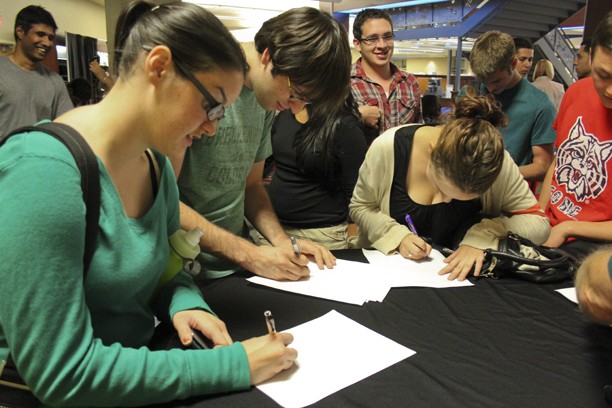The non-profit organization TED held an event Thursday evening on the subject of “Civil Discourse on the Eve of Elections” at the UofA Bookstore.
TED is a national organization that holds large conferences and smaller events on topics that the organization feels are “ideas worth spreading.” Their Tucson branch, called TEDxTucson, organized the event.
The first speaker, Carolyn Lukensmeyer, spoke about perceived dissatisfaction of American voters with the current system. Lukensmeyer is currently the executive director of the National Institute for Civil Discourse at the University of Arizona.
“How many of you do feel like we’re headed in the wrong direction?” Lukensmeyer asked the audience, which prompted a raised hand from nearly everyone.
She then asked, “How many of you would like to do something about that?” Again, nearly the entire audience was in agreement.
“How many of you feel like you know what you could do tomorrow to start shifting this curve in a more positive direction?” she then asked.
Only two hands appeared.
In order to show the importance of participation in the political system, Lukensmeyer said that the political system only shifts when the public largely demands it.
Lukensmeyer then showed the audience a collection of polling data which she felt reinforced her point.
According to her data, 46 percent of people surveyed were more enthusiastic about participating in this election than in past elections. 29 percent were about the same, and 24 percent were less enthusiastic.
Lukensmeyer focused on those who were not as likely to participate in the upcoming election, pointing out that only about 40 percent of those eligible to vote do.
“If 24 percent of people who voted in the last election don’t vote in this election, that will decide the election,” she said.
Another survey question focused on the biggest reason that the government has not been able to solve key problems, such as health care and the economy.
According to Lukensmeyer’s data, the most selected reason was that “dysfunctional partisanship” was to blame. The second-most popular opinion was that politicians only care about getting elected.
Lukensmeyer pointed to “pundits in Washington,” who she said are claiming that because of negativity in advertising, that less Americans will be less engaged in this election than in 2008.
“Don’t let the pundits tell us how we’re going to behave,” she said. “It’s our choice about how engaged we intend to be.”
The second speaker was Ted Downing, “a leading election reform advocate,” according to TED’s website, who ran for the Arizona State Senate as an Independent in 2010. Downing focused more on the political system as a whole, as well as the history of American elections overall.
“There’s a perception building, and this one may be true, that a minority is controlling a majority,” Downing said, adding that only members of a political party can vote in that party’s primary, and that open primaries would make for a more open political process.
He also gave his views on the importance of state governments.
“Because of the 10th Amendment, we’ve created a system of government that allows most of the action to take place at the state level,” he added. “Most of the things influencing your daily life happen there.”
TED is having another presentation on Nov. 15 featuring speakers on technology and art. They are also having a larger conference on Dec. 8. Both events will be held on the UA campus.
Lewis Humphreys, a local organizer for TED in Tucson, said that the organization is increasing its focus on students.
“We’re trying actually to increase the exposure of what we’re doing with students because I think students are really into TED and really inspired by TED.”
He also spoke about the overall goal of this event, and of TED events nationwide.
“TED is all about ideas worth sharing. The whole point of these events is to bring people together and have them listen to ideas that inspire them.”








